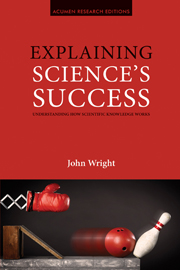Book contents
- Frontmatter
- Contents
- 1 Some surprising phenomena
- 2 Some unsatisfactory explanations of the phenomena
- 3 A defeasible a priori justification of induction
- 4 The independence of theory from data
- 5 Some more success-conducive properties of theories
- 6 Newton's laws of motion and law of gravitation
- 7 Special relativity
- 8 Mendelian genetics
- 9 Conclusion
- Notes
- Bibliography
- Index
2 - Some unsatisfactory explanations of the phenomena
- Frontmatter
- Contents
- 1 Some surprising phenomena
- 2 Some unsatisfactory explanations of the phenomena
- 3 A defeasible a priori justification of induction
- 4 The independence of theory from data
- 5 Some more success-conducive properties of theories
- 6 Newton's laws of motion and law of gravitation
- 7 Special relativity
- 8 Mendelian genetics
- 9 Conclusion
- Notes
- Bibliography
- Index
Summary
In this chapter we will consider some possible explanations of the three phenomena described in Chapter 1. It will be argued that none of them are satisfactory.
MIGHT THE PREDICTIVE SUCCESSES OF SCIENCE SIMPLY BE DUE TO GOOD LUCK?
The first of the phenomena is the ability of science to successfully predict novel phenomena. It is worth stressing at the outset that the question with which we are here concerned – how is the ability of science to predict novel phenomena to be explained? – is distinct from the question of whether novel predictive success has any special epistemic status. While many authors have claimed that the ability of a theory to successfully predict novel phenomena is an especially strong form of confirmation, there have also been dissenters from this view. But the issue is logically distinct from the question “How is the ability to make successful predictions to be explained?”
One natural response is to suggest that perhaps this form of success is simply due to good luck. Certainly, science has had some impressive predictive successes: some of these were listed in the previous chapter. But it has also had many predictive failures. The history of science is largely the history of one theory being advanced, tested, refuted and then replaced by another. According to Karl Popper, this is the way in which science progresses: the refutation, or predictive failure, of theories is an integral part of scientific progress.
- Type
- Chapter
- Information
- Explaining Science's SuccessUnderstanding How Scientific Knowledge Works, pp. 13 - 37Publisher: Acumen PublishingPrint publication year: 2012

